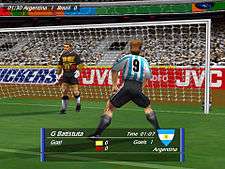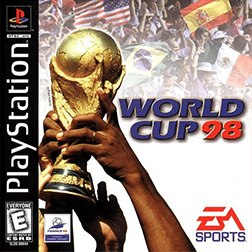World Cup 98 (video game)
| World Cup 98 | |
|---|---|
|
North American PlayStation cover art | |
| Developer(s) |
EA Canada Tiertex Design Studios (Game Boy) |
| Publisher(s) |
EA Sports THQ (Game Boy) |
| Series | FIFA World Cup |
| Platform(s) | Game Boy, Nintendo 64, PlayStation, Windows |
| Release date(s) | |
| Genre(s) | Football/Soccer |
| Mode(s) | Single player, multiplayer |
World Cup 98 (known in Europe as FIFA World Cup 98) was the first official FIFA World Cup game developed by EA Sports after obtaining the rights from FIFA in 1997. Unlike the previous World Cup games, which were in 2D and showed a bird's-eye view, World Cup 98 was the first in the franchise to use a 3D engine, utilising DirectX for the PC version. Accurate national team kits (except for the goalkeepers who were issued a generic kit) were introduced complete with kit manufacturer logos and official merchandise. The game engine is based on that of FIFA: Road to World Cup 98, though it features some minor gameplay improvements to areas such as ingame strategy changing and player positioning. The playable teams in the friendly mode also included several nations that did not qualify for the finals. World Cup 98 was released for Microsoft Windows, PlayStation, Nintendo 64 and Game Boy.
Game modes

The main feature of the game is the World Cup tournament itself, where the player may use either the actual groups used in the finals, or groups composed of a random selection of the included teams. Each match takes place in a recreation of the venue it was played in the actual tournament. As in the real tournament, group games do not go to extra time or a penalty shootout but knockout matches do.
The game was released prior to the actual World Cup, therefore results between CPU teams are not based on results from the actual tournament. At the end of each match, a caption shows the man of the match award, and if applicable a clean sheet caption. At the end of the "World Cup" game mode, captions show the winner of the Golden Boot for most goals scored during the tournament and winner of the FIFA Fair Play Award, two awards which are given in the real World Cup.
It is also possible to play friendly matches between any of the teams that are included in the game. At the end of a drawn game the player can choose to finish the match as a draw, play extra time with the golden goal rule, or take part in a penalty shootout.
As in FIFA 98, national squads can be customised to reflect the actual tournament's players by including players from a reserves pool in the "customise" option.
The "World Cup Classics" mode allows the player to play fifteen classic FIFA World Cup matches. The 1982 match is unlocked by winning the "World Cup" mode, and by completing each unlocked game, the next one is unlocked in the order shown below. "World Cup Classics" mode features accurate period team kits (except for the goalies), hairstyles and names, and commentary for this mode only was provided by Kenneth Wolstenholme, the BBC's commentator during the 1966 and 1970 FIFA World Cup. For the 1966, 1954 and 1950 World Cup Final matches in this mode, the graphics are in black and white, as they were shown on television at the time. The 1938 and 1930 matches are shown using sepia tone graphics. In matches that took place prior to the introduction of substitutions, it is not possible to change a player during the match (however, this also applies to the 1970 final, which was when substitutions became the rule). Other historical inaccuracies include cards being awarded to players in matches prior to 1970 and the use of brown leather balls for matches from 1970 onwards, in lieu of balls like the Adidas Telstar (for 1970 and 1974) and the Adidas Tango España (for the 1982 final).
The game features every team that qualified for the 1998 FIFA World Cup, as well as eight others who did not.
Commentary
The United Kingdom version of the game features commentary from John Motson and Chris Waddle, with matches introduced by the voice of Des Lynam and voice-overs in the team schedules from Gary Lineker.
Teams
The game features each of the 32 teams that qualified for the 1998 FIFA World Cup, and 8 teams that did not qualify.
Qualified teams:
|
Teams that did not qualify:
Reception
| Reception | |||||||||||||||||||||||||||||||||||||||||||||||||||||||||||
|---|---|---|---|---|---|---|---|---|---|---|---|---|---|---|---|---|---|---|---|---|---|---|---|---|---|---|---|---|---|---|---|---|---|---|---|---|---|---|---|---|---|---|---|---|---|---|---|---|---|---|---|---|---|---|---|---|---|---|---|
| |||||||||||||||||||||||||||||||||||||||||||||||||||||||||||
The game was met with positive reception. GameRankings gave it a score of 85% for the Nintendo 64 version,[17] 80% for the PlayStation version,[19] and 76% for the PC version.[18]
The PlayStation version was a bestseller in the UK.[20] PC Guide's July 1998 issue named World Cup 98 as the winner of a group test involving other PC football games around at the same time, ahead of competitors such as Actua Soccer 2, Three Lions and Sensible Soccer 98. The magazine described the game as "Simply the best football game in the world."[21]
See also
References
- ↑ Cook, Brad. "World Cup 98 (PC) - Review". AllGame. Archived from the original on November 16, 2014. Retrieved April 15, 2015.
- ↑ Edge staff (July 1998). "FIFA World Cup 98 (PC)". Edge (60).
- ↑ EGM staff (1998). "World Cup 98 (N64)". Electronic Gaming Monthly.
- ↑ EGM staff (1998). "World Cup 98 (PS)". Electronic Gaming Monthly.
- ↑ "World Cup 98 - Nintendo 64". Game Informer (62). June 1998. Archived from the original on September 9, 1999. Retrieved April 15, 2015.
- ↑ Air Hendrix (1998). "World Cup '98 Review for N64 on GamePro.com". GamePro. Archived from the original on January 23, 2005. Retrieved April 15, 2015.
- ↑ Air Hendrix (1998). "World Cup '98 Review for PlayStation on GamePro.com". GamePro. Archived from the original on February 9, 2005. Retrieved April 15, 2015.
- ↑ Colin (June 1998). "World Cup '98 Review (N64)". Game Revolution. Archived from the original on February 3, 1999. Retrieved April 15, 2015.
- ↑ Tony V. (June 1998). "World Cup 98 (PS)". Game Revolution. Archived from the original on March 8, 2005. Retrieved April 15, 2015.
- ↑ Smith, Josh (June 5, 1998). "World Cup 98 Review (N64)". GameSpot. Retrieved April 15, 2015.
- ↑ Smith, Josh (June 5, 1998). "World Cup 98 Review (PC)". GameSpot. Retrieved April 15, 2015.
- ↑ Smith, Josh (May 8, 1998). "World Cup 98 Review (PS)". GameSpot. Retrieved April 15, 2015.
- ↑ Schneider, Peer (May 20, 1998). "World Cup 98 (N64)". IGN. Retrieved April 15, 2015.
- ↑ Perry, Douglass C. (July 15, 1998). "World Cup 98 (PS)". IGN. Retrieved April 15, 2015.
- ↑ "World Cup 98 (N64)". Nintendo Power. 109. June 1998.
- ↑ "World Cup 98". Official U.S. PlayStation Magazine. 1998.
- 1 2 "World Cup 98 for Nintendo 64". GameRankings. Retrieved April 15, 2015.
- 1 2 "World Cup 98 for PC". GameRankings. Retrieved April 15, 2015.
- 1 2 "World Cup 98 for PlayStation". GameRankings. Retrieved April 15, 2015.
- ↑ "Gallup UK PlayStation sales chart". Official UK PlayStation Magazine (35). August 1998.
- ↑ James, Chris (July 1998). "Football's Coming Home". PC Guide. Future Publishing. 4 (4): 53–57.
External links
| Preceded by World Cup USA '94 |
FIFA World Cup Official Licensed Video Game 1998 |
Succeeded by 2002 FIFA World Cup |
